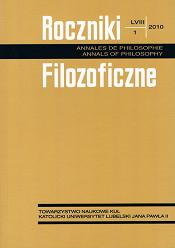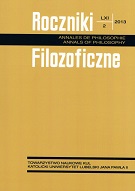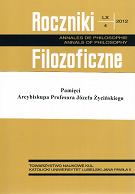


Keywords: Thomas Reid; dualism; perception; common sense; foundationalism; agnosticism; theism; dualizm; percepcja; zdrowy rozsądek; fundacjonalizm; agnostycyzm; teizm
The aim of the article is to present and analyze three doctrines of Thomas Reid that underlay his many sided philosophy. The first one is dualism of active minds and passive bodies that Reid simply assumes as obvious. In contrast to other interpreters I think that dualism is not marginal thesis that can be omitted in Reid’s theory of perception. On the contrary, it shapes characteristic features of that theory, such as presentationalism, and direct realism. It is also responsible for the fact, that some historians of philosophy treat Reid as a proponent of occasionalism. The second doctrine is pluralistic foundationalism. It is quite different than foundationalism of Descartes since it assumes many different principles that cannot be proved. As such they have to be accepted as obviously true and obligatory in our thinking. Hume would agree with Reid that we cannot prove such principles but his conclusion would be different: that for this reason they are not true. The third doctrine I called agnosticism within theism. Reid accepts certain metaphysical theses (mind-body dualism, theory of substance as a basis for e.g. personal identity, etc.) as obvious principles, but he rejects any metaphysical speculation about their nature and relation between them. He does it on the basis of his theism that stresses limits of human cognition in relation to trustworthy God. Reid encourages scientific research that applies Newtonian empirical method (also in philosophy of mind). However, on the basis of such research we can reach only physical causes of various phenomena and present them in the form of laws of nature. From metaphysical perspective the only answer we can give is that the ultimate cause is God. Mediate metaphysical causes (between God and phenomena that are to be explained) cannot be known to us.
More...
Keywords: Gravity Probe B (GP-B); General Theory of Relativity (GTR); history of science; philosophy of science; ogólna teoria względności (OTW); historia nauki; filozofia nauki
Space-based experiments in fundamental physics are presently capable of uniquely addressing important questions related to the fundamental laws of nature. In this article we discuss the advances in our understanding of fundamental physics that recently proposed space-based gravitational experiment such as Gravity Probe B Space Research Mission. Gravity Probe B is a satellite that will check two predictions of the general theory of relativity: the geodetic effect and socalled frame-dragging or Lense-Thirring effect. The purpose of this article is to describe the results that have been obtained in Gravity Probe B mission from the point of view of the history and philosophy of science. This article discusses also a problem of the financial challenges for the GP-B team.
More...
Keywords: religion; religio vera; true religion; religia; religia prawdziwa
The article characterizes my way of recognizing the Catholic religion as the true religion. This recognition is a multi-motif process. I recognize the Catholic religion as religio vera, which does not mean that I completely justify the fact that it is a religio vera. I characterize the following ways to recognize the Catholic religion as being true: 1. The way of using philosophical arguments. 2. The way of recognizing legitimacy of the claims made by the Magisterium (the teaching authority of the Catholic Church). 3. The way of recognizing the sign character of the Church. 4. The way of assessment of the explanative value of the Church’s doctrine.
More...
Keywords: J. Locke; G. Berkeley; existence; matter; corpuscularism; scepticism; perception; istnienie; materia; korpuskularyzm; sceptycyzm; percepcja
The paper seeks to answer the question about the actual influence of the Lockean thought on Berkeley’s philosophy. It promotes the view that though scepticism that arises from the representational theory of perception is an important factor for motivating Berkeley to built his antisceptical strategy, it is the so-called corpuscular scepticism that was in fact an essential element of this influence. The latter was a consequence of assuming the notion of corpuscular, yet unknown material substance by Locke, and motivated Berkeley to consider an argument for rejection of the existence of such substance. The Berkeleian anti-sceptical argument here seems congenial to the Cartesian origins of his definition of existence, and enables us to combine the Lockean perspective with the Cartesian reading of sources of Berkeley’s philosophy.
More...

Keywords: truth-functional operator; informal logic; non-classical logic; classical propositional Calculus; funktor prawdziwościowy; logika nieformalna; logika nieklasyczna; klasyczny rachunek zdań
D. Sherry’s main theses included in his essay entitled “Formal Logic for Informal Logicians” are presented in the article. In a discussion with his theses it is shown that he prefers this kind of logic that has a lot of elements that are the same as in Aristotle’s logic understood as the art of thinking and the technique of discussion taken from Topics, and not the logic that was started in his Prior Analytics. It is also shown that not only patterns of inferring, but also the theses of logic, as well as theses to which no patterns correspond, that are guarantee reliability of inference patterns, may be intuitively obvious. In the article also attention is drawn to the fact that the Plsystem of logic presented by Sherry was characterized by him by means of a rather poor logical terminology. In the American author’s argument there are no clear distinctions between the thesis of logic, the logical inference pattern and the rule of the procedure of proving. However, it can be established that the PL- system is constituted by argumentation patterns that are reliable owing to such theses of propositional logic as modus potens, modus tollens, disjunctive syllogism, conjunctive syllogism, complex destructive dilemma, and the two rules concerning creating proofs, i.e. the rule of conditional proof and the rule of reduction to the absurd. In the PL- system there are fewer theses than in the classical propositional calculus, but this has nothing in common with the so-called multivalent logics to which some theses of classical logic supposedly do not apply. Everything suggests that some systems of non-classical logic systems may be built on the PLsystem; namely, the ones in which theses are given that govern the correct use of non-extensional operators connected with key terms appearing in many sciences, like e.g. “time”, “change”, “causality”. Sherry’s essay reveals that he is a supporter of the thesis that knowledge of formal logic is necessary for using informal logic efficiently, which is necessary for teaching logic properly.
More...
Keywords: Jesus; “mad; bad; or God”; mistake; Jezus; "szaleniec; złoczyńca; czy Bóg"; pomyłka
More...
Keywords: Aristotle; truth; truth in logical understanding; extra-logical aspects of truth; discursive knowledge (episteme); theoretical wisdom (sophia); practical wisdom (phronesis); desire (orexis); art (techne)
The article deals with the problem of truth by Aristotle. The study begins a presentation of the main cognitive dispositions, mentioned in Book VI of Nicomachean Ethics, by which man achieve the truth. A next object of analysis is the truth in logical understanding. Its “place” is the intellect performing acts of judgment, standing at the basis of discursive knowledge. Having in mind that the determinants of so understood truth are things, further investigations are focused on except logical aspects of truth. Aristotle defines them, as in the case of logical truth, on the base of human cognitive dispositions, which–apart from discursive knowledge (episteme)—include theoretical wisdom (sophia), practical wisdom (phronesis), desire (orexis), and art (techne). The actions emerging from these dispositions are also a form of cognitive agreement with reality, and consequently can be considered as a kind of truth. Despite that here as well, the truth is connected with the cognitive functions, its determinants are also real things. This leads to a crucial question of the presented article which concerns the truth of things themselves. According to Author, Aristotle does not give a directly answer, although his certain remarks touch this problem. Their examination allows better to understand the later conceptions of truth.
More...
Keywords: rationality of christianity; argument "mad; bad; or God"; "dwindling probabilities"; racjonalność chrześcijaństwa; argument "szaleniec; złoczyńca; albo Bóg"; malejące prawdopodobieństwa
More...
Keywords: elementary ontology; Leśniewski's systems; oblique syllogisms; classical calculus of Relations; ontologia elementarna; systemy Leśniewskiego; sylogizmy ukośne; klasyczna teoria relacji
The notion of relation is one of the most important concepts present in our language. This study propose some extension of elementary ontology (OE) for relational variables and defining in his framework the concepts of the classical calculus of relations. Such enriched elementary ontology (OER) is a better tool for the analysis of natural language. It is shown that syllogistic with the negative terms enriched by so called oblique syllogisms (SNU with the axioms C1–C5) is a fragment of OER system (Theorem 1). The OER system is enriched next with individual variables (a,b,c) and by assuming the individual term referentiality (axiom A2) we obtain OER* system. The Proof that the classical calculus of relations (KRR) is a part of the system OER* (Theorem 2) is given.
More...
Keywords: new natural theology; science; philosophy of science; panenteism; naturalism
The passion for unifying is one of the most characteristic features of Józef "ycinski’s thought. It is also noticeable in the area of natural theology which he proposes. This theology can be named ‘catholic’. "yci)ski takes care of compatibility of his results with the doctrine of The Catholic Church. He tries to unify different streams and points of view in one conception. He stands for methodological naturalism which is not inconsistent with looking for ultimate explanations of reality beyond science. "yci)ski accepts panentheism inspired by philosophy of Whitehead as the most plausible theory of correlation between God and the world. This paper shows the project of synthesis which can be found in books and articles by "yci)ski, points the elements which his natural theology is built of, and indicates the questions and problems connected with this theory. Finally, there is shown the importance of "ycinski’s natural theology which ranks to “new natural theologies”.
More...
Keywords: experience; observation; comparability; relations between theory and experience; scientific theory
The paper is divided in several parts, entitled as follows: introduction; the standard view, its characteristic; constructive challenge of the received standpoint; attempted resolutions of the problem of comparability; how do work visual perceptions in scientific observations? meaning variance of scientific terms; an attempt to construe the ground for comparability—concluding remarks.
More...
Keywords: methodological naturalism; science-religion relation; interdisciplinary naturalness; rationality; Życiński
The dialogue between science and religion held by Józef yci'ski presents a vision, in which the two disciplines exist complementarily and complete each other. In his opinion the basis of the dialogue is a reliable methodology, in which the very fundamental issue is methodological naturalism. yci'ski suggests that apparent conflicts stem from incorrect interpretation of the Holy Bible or fundamentalist understanding of science. He therefore provides the right, in his opinion, interpretation of the Book of Bible and the Book of Nature. Józef yci'ski demonstrates that in Christianity we deal with affirmation of rationality. This, among others, is the reason we should talk about Christian sources and inspirations of contemporary science.
More...
Keywords: suffering; God; evil; kenosis; omnipotence
The article considers the most important theodicean problems in Józef #yci'ski’s texts. The author of the article examines the issue of the existence of God and evil taking into account the following arguments: (1) the argument from God’s kenotic presence in nature, (2) the argument from an unjustified extrapolation of the feeling of absurdity, (3) argument from the limits of God’s omnipotence, which includes (3a) the argument from the price for the another direction of evolution, and (3b) the argument from transworld depravity, (4) the argument from an analogy between limitation claims in logic and mathematics and ontological determinants of suffering, (5) the argument from moral beauty, persuasion and mystery.
More...


Keywords: God; panentheism; philosophy of nature; process philosophy; rationality field; Whitehead; Życiński
Three issues of yci&ski’s philosophy are inspired by the process philosophy of A.N. Whitehead’s and his followers: (i) a comprehension of event-dynamic structure of nature as a creative process towards novelty, (ii) a link between the rationality field hypothesis and Whitehead’s concepts of eternal objects and potentiality, (iii) a panentheistic idea of God that emerges from the theory of God’s two natures (aspects). Starting from an analysis of the ontic structure of nature and heading for a grasp of the world’s immanent aspect of God, yci&ski follows the neoclassical path of natural theology that is close to processualism. A discovering of transcendent God, that reveals himself in natural processes as the rationality field, brings important consequences for an explanation of God’s attributes and His relation to relatively autonomous creatures. Multithreaded processual inspirations enable us to see those aspects of yci&ski’s philosophy and theology in a broad metaphysical context.
More...
Keywords: panentheism; classical theism; pantheism; Hartshorne; Życiński; natural (philosophical) theology
In this paper I try to present some main origins, varieties, motives and ideas of the philosophical and theological movement called “the panentheistic turn”. Particular attention is paid to the Ch. Hartshorne’s combinatorial analyses (based on “the law of polarity”) and to the J. !yci'ski’s conception of “the field of rationality”. I distinguish five forms or domains of the contemporary panentheism. The first of them—the linguistic one—uses the preposition in or spatial metaphors to express the relation between God and the world. The second—the (inter)cultural panentheism — is the result of searching for a common theology to many different religions. The third type—the Christian panentheism – interprets some main dogmas of Christian faith in the spirit of kenotic theology. At an end the ontological panentheism can be defined as the metaphysics (of God and world) emerged from the German idealism and the process philosophy. Its newest kind is the scientific panentheism based on the idea of emergence. After these distinctions I compare the ontological panentheism with the classical theism. In my opinion there are some irremovable differences between both options. I also defend the thesis that the main arguments given by the panentheists against the classical theism do not constitute the sufficient reasons to prefer their position.
More...
Keywords: pluralizm naukowy; Józef Życiński; Rudolf Carnap; wnioskowanie kontrfaktyczne
" The paper outlines and discusses the major tenets of moderately pluralistic methodology. The latter is juxtaposed to J. !yci"ski’s principle of natural interdisciplinarity. It instantiates scientific pluralism as a domain-specific agenda for research. The symbolic and causal understanding are integrated in this methodological conception by means of a specific kind of counterfactual reasoning, which is coined the delimiting counterfactual. It makes the moderately pluralistic methodology applicable to non-experimental research. "
More...